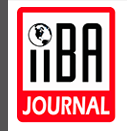Abstract
The aim of this research is to propose a process dynamic model for measuring and benchmarking performance in hotel food and beverage operations. This model involves three sequential stages; first, identifying the existing performance measures used in hotels; followed by, calculating performance using Data Envelopment Analysis (DEA) and LINGO application; third, benchmarking the performance index. The research design involves a case study methodology with the choice of mixed methods. It uses 20 in-depth semi-structured interviews, group discussions, archival analysis, and direct observations. A panel data from 2007 until 2016 was obtained from the hotel cases to get performance calculations and benchmarks. The qualitative analysis of interviews identified different subjective performance measuring techniques such as forced choice, job rating checklists, BARS, 360-Degree and output index. However, the balanced scorecard method was not used at all. The quantitative analysis of DEA rankings confirmed examples in which hotel outcome in relatively high performance and in which year. The model developed in this qualitative case study could be used to compare different hotels in relation to their performance index and could offer some decisions for improvement to the hotel management. The research findings have implications in theory and practice, which will have profound value to the investigated hotel managers and the Egyptian hotel sector. The main contribution of this paper is its suggested dynamic model which will use for measuring and benchmarking performance in hotels based in Egypt.
Keywords
mixed methods, DEA, BARS, hotel performance, benchmarking, Egypt
Chinese Abstract
应用混合方法建立埃及酒店绩效测量模型:以一家连锁酒店为例
本研究旨在提出一种用于衡量和基准化酒店餐饮经营绩效的过程动态模型。该模型包括三个依次进行的阶段:首先,确定酒店现有的绩效衡量标准;其次,利用数据包络分析(DEA)和LINGO应用计算绩效;第三,对绩效指数进行基准化。本文采用混合方法的案例研究,包括20个半结构化深度访谈、小组讨论、档案分析和直接观察。研究从2007年至2016年的案例酒店中获取面板数据,计算绩效和基准。访谈的定性分析发现酒店使用了不同的主观绩效测量技术,如强制选择、工作评分检查表、BARS、360度和产出指数,却完全没有使用平衡计分卡法。通过对DEA排名的定量分析,证实了哪家酒店在哪一年的绩效较高。本定性案例研究所建立的模型可用以比较不同酒店的绩效指数,并为酒店管理层提供一些改进建议。研究结果在理论和实践上都有借鉴意义,对被调研的酒店管理者和埃及整个酒店业有深远的价值。本文的主要贡献在于提出的动态模型可用于衡量和基准化埃及酒店的绩效。
关键词:混合方法,DEA,BARS,酒店绩效,基准化,埃及
DOI
10.5038/2640-6489.4.1.1054
Recommended Citation
Zaki, K. G. (2019). Using the mixed methods research to model the hotel performance measurement in Egypt: An example from a hotel chain. Journal of Global Business Insights, 4(1), 18-33. https://www.doi.org/10.5038/2640-6489.4.1.1054
Creative Commons License

This work is licensed under a Creative Commons Attribution-Noncommercial 4.0 License


